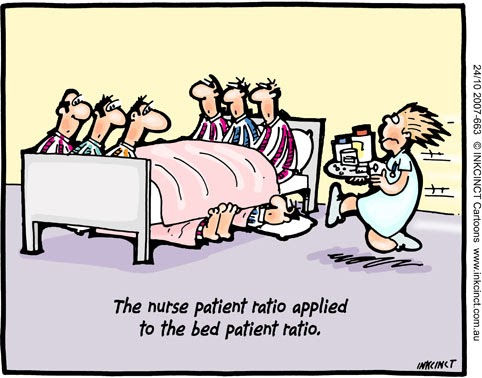A Mandatory Issue, Nurse Staffing
- Sara Bergenholtz
- May 18, 2023
- 4 min read
Updated: May 26, 2023
Ah staffing, we love you, we hate you. If only we could be with those lucky souls in California with their mandatory ratios and lovely labor laws. But, without, you know having to move to California because Washington is a great place to be.
The recent passing of the safe staffing bill was an important achievement, no question. Yet with full implementation awaiting in the distant mists of 2027, or maybe 2029 (there are a lot of dates in that bill, I'll have to check again), we have some real world problems that need to be addressed now.

But Sara, you say, the law is the law. What more is there for us to do but work with the tools we've been given.
Just that, I say. Work with the tools we've been given.
In collective bargaining we have things known as "Mandatory Subjects of Bargaining" and "Permissive Subjects of Bargaining". The first of these are topics the employer must bargain with the representative association. You know that old refrain wages, hours and working conditions? Those are all mandatory subjects of bargaining and it's the last I want to ask everyone to take a hard look at.
Working conditions. It's a fairly broad term, perhaps a little vague to the employers advantage. Do you know what I think falls into that category? Staffing ratios. And I'm not alone. In 2019 the International Association of Firefighters (IAF) Local 46 took the city of Everett to court over staffing. They sought to prove, and did to the courts satisfaction, that there is a direct relationship between staffing and the workload and safety of those they represent. Agreeing with them, the courts determined that staffing is a mandatory subject of bargaining (http://www.courts.wa.gov/opinions/pdf/778315.pdf).
Granted, this was firefighters and not nurses. And granted, this was the result of the decision of the Public Relations Commission, so the firefighters weren't making this argument alone. And granted, these are public employees which not all nurses are.
But some are.
And even if we aren't, if there has been enough evidence to support the impact staffing has on the workload and safety of firefighters, how can anyone argue that there isn't at least the same amount of evidence of the impact to the working life, the working conditions, of nurses?
I am going to go ahead and say that there is, we just haven't been approaching the issue in a manner that allows us to utilize the information the way those of IAF Local 42 did. And that needs to change. Even if we start with those hospitals that are publicly owned, often critical access facilities which legislators are famously reticent to include in our issues without at least a delay, this is an argument we cannot afford to ignore. Not in a world where hospital administrators are, even now, constantly ignoring decades of research and cutting nurses for the quickest cut to their budgets.
LEAN was the worst thing to happen to healthcare, I swear.
Okay, that's not true. Private equity firms investing in healthcare systems was probably the worst, but that's another post altogether.
Of interest, the firefighters aren't alone. The article at the end of this link, https://aftvoices.org/thousands-of-grievances-lead-to-a-short-staffing-arbitration-victory-b5b88c8f236c, from AFT tells the story of how in 2022 the United Federation of Nurses (UFT) used the arbitration process to win a monetary settlement against their hospital for being short staffed. And lord knows, like a politician Hospitals tend to pay attention when you hit them in the pocketbook. This isn't exactly the same, the UFT nurses were able to address this through some truly lovely contract language that most of us don't have, and this was an arbitration not a court decision affirming staffing as a mandatory subject of bargaining. And it was in New York, not Washington. Yet it demonstrates that there are more ways than one to approach the issue and, most importantly, win.
Safe staffing is working conditions (it's absurd to try and say that its not) and while the courts and the NLRB have not yet determined that it is a mandatory subject of bargaining when it comes to nurse contracts I think it would be just fine if we, that is to say the nurses of Washington State, decide that it is all on our own.
Sure, the employers can refuse to negotiate it, just like Mt Sinai and Montefeore (I am certain I didn't spell that right, apologies) tried to do in New York State this year. Does anyone rember how that went for them? I seem to remember the hospitals coming out with a bang, but they seemed to fade away with the tinniest whimper...
Those nurses in New York committed to making staffing ratios in their contract something they would not compromise on, a commitment that made the subject mandatory whatever the authorities say. If we can muster the will and the desire, the commitment of the 6000 nurses in New York who now have contractual safe staffing ratios, we can do it too.
It's not like there isn't a precedent. Look over the Tacoma General contract. You know what you'll find? Contracted ratios. Even in Washington others have tried this, and succeeded.
Nurses are the largest block of healthcare employees and we are both more trusted and stronger than we know. We excel at advocating for those in our care, for our communities. Let's turn that around and advocate for each other and get this thing done. No more excuses. No more waiting for legislators who have no understanding of what we do or how we do it to understand enough to care and finally do the right thing.
As with so many other issues, nurses are just going to have to clean up this mess we've been handed on our own. We've done it before. And if we can't do it for ourselves, let's remember that every patient assigned to a nurse in an acute care setting increases the risk for mortality for all of their patients by
7%-10%. Fighting for safe staffing on all available fronts is advocating for our patients.
Let's get to it.
(This January the staffing of Central Washington Hospital in Wenatchee was gutted, The nurses did the only thing they could, researched, voiced and wrote their concerns. Because I'm proud of their effort I've included their letter to the DOH, still unanswered, for everyones enjoyment. Happy reading, I guess.)







Comments